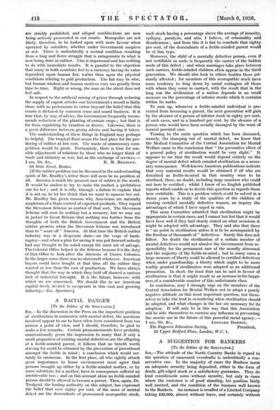A RACIAL DANGER
[To the Editor of the SPECTATOR.]
Snt,—In the discussion in the Press on the important problem of sterilization in connexion with mental defect, the questions involved appear to me to have often been considered from too narrow a point of view, and I should, therefore, be glad to make a few remarks. Certain pronouncements have probably unintentionally given the impression to many that if only a small proportion of existing Mental defectives are the offspring of 'a feeble-minded parent, it follows that no benefit worth striving for could be obtained by the prevention of parenthood amongst the feeble in mind ; a conclusion which would cer- tainly be erroneous. In the first place, all who rightly attach great importance to home environment must agree that persons brought up either by a feeble-minded mother, or by some substitute for a mother, have in consequence suffered an irretrievable loss ; and on this account alone no feeble-minded person should be allowed to become 'a parent. Then, again, Dr. Tredgold, the leading authority on this subject, has expressed the belief that over eighty 'per cent. 'of the cases of mental defect are the descendants of pronounced neuropathic stock,
such stock having a percentage above the average of inaanity, epilepsy, paralysis, and also, I believe, of criminality and drunkenness ; and from' this it is fair to conclude that eighty per cent. of the descendants of a feeble-minded parent would be of this type.
Moreover, the child of a mentally defective person, even if not certifiable as such, is frequently the carrier of the hidden seeds of this defect ; and when marriages take place between such carriers, feeble-minded children often appear in the third generation. We should also look to others besides those pri- marily affected ; for members of this neuropathic stock have some tendency to drag down by social contagion all those with whom they come in contact, with the result that in the long run the civilization of a nation depends in no small measure on the percentage of inferior stocks which it contains within its ranks.
To sum up, whenever a feeble-minded individual is pre- vented from becoming a parent, the next generation will gain by the absence of a person of inferior stock in eighty per cent. of such cases, and in a hundred per cent, by the absence of a person who would have been socially damaged by the want of normal parental care.
Turning to the main question .which has been discussed, namely, the stamping out of mental defect,, we know that the Medical Committee of the Central Association for Mental Welfare came to the conclusion that " the preventive effect of a general policy of sterilization would be very slight." It appears to me that the result would depend entirely on the degree of mental defect which entailed sterilization as a neces- sary consequence. Well-known American publications indicate that very material results would be obtained if all who are described as feeble-in-mind in that country were to be sterilized, these, no doubt, including large numbers who could not here be certified ; whilst I know of no English published reports which enable us to decide this question as regards those here certifiable. This is a problem which could be solved in a dozen years by a study of the qualities of the children of existing certified mentally defective women, an inquiry the advantages of which I have urged in vain.
This same Committee admitted that sterilization might be appropriate in certain cases, and I cannot but feel that it would have been well if they had clearly stated on what occasions it might be adopted with advantage. They said also that there is " no point in sterilization unless it is to be accompanied by the freedom of thousands of " defectives. Surely this does not follow. No doubt the sterilization of a certain number of mental defectives would not absolve the Government from re-. sponsibility for the permanent care of the morally abnormal and the majority of the feeble-in-mind ; but in many cases a large measure of liberty could be allowed to certified defectives when under guardianship, a liberty which ought to be more readily granted if sterilization were adopted as an additional precaution. In short, the least that can be said in favour of sterilization is that it might result in an increase in the happi- ness of a considerable number of this unfortunate class. In conclusion, may I strongly, urge on the members of the Central Association for Mental Welfare not to adopt a purely negative attitude on this most important question, but them- selves to take the lead in co nsidering when sterilization should be adopted, and what changes in the law are necessary for its adoption. It will only be in this way that this Association will be able themselves to exercise any influence in preventing the unwise use in the future of this powerful racial agency.–.
The Eugenics Education Society, President.. 52 Upper Bedford Place, London, W.C. 1.






































































 Previous page
Previous page